

Is Low-Grade Inflammation Making You Mentally Sluggish? Certain types of cognitive sluggishness, mental fatigue, and "brain fog" may be linked to systemic inflammation, according to a new study.
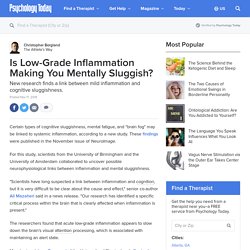
These findings were published in the November issue of NeuroImage. For this study, scientists from the University of Birmingham and the University of Amsterdam collaborated to uncover possible neurophysiological links between inflammation and mental sluggishness. article continues after advertisement "Scientists have long suspected a link between inflammation and cognition, but it is very difficult to be clear about the cause and effect," senior co-author Ali Mazaheri said in a news release. "Our research has identified a specific critical process within the brain that is clearly affected when inflammation is present. " The researchers found that acute low-grade inflammation appears to slow down the brain's visual attention processing, which is associated with maintaining an alert state. Source: adike/Shutterstock Related posts: How Willpower Works: Decision Fatigue and How to Avoid Bad Choices.
Why do we make unhealthy and unproductive choices — even when we know we should do better?
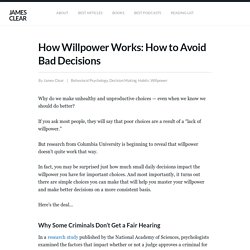
If you ask most people, they will say that poor choices are a result of a “lack of willpower.” But research from Columbia University is beginning to reveal that willpower doesn’t quite work that way. In fact, you may be surprised just how much small daily decisions impact the willpower you have for important choices. And most importantly, it turns out there are simple choices you can make that will help you master your willpower and make better decisions on a more consistent basis. Here’s the deal… Why Some Criminals Don’t Get a Fair Hearing. Fighting Decision Fatigue with the Power of Positive Habits. It’s probably no surprise to you that the number of decisions we make each day is estimated to be in the thousands!
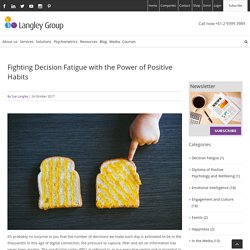
In this age of digital connection, the pressure to capture, filter and act on information has never been greater. The pre-frontal cortex (PFC), is referred to as our executive centre and is essential in decision making, yet in order to function well the PFC requires dopamine, the brain's fuel! How many times have you found yourself at the end of the day, agonising over what to cook for dinner, or which TV show to watch? Seemingly simple decisions become mammoth tasks because our brains run low on fuel. Given that we all have to make many decisions on a daily basis, I want to share with you how and why I use the power of building positive habits to help combat decision fatigue so that you can do the same. People often ask me about what I wear.
You see, when I work, be it facilitating or presenting keynotes, I only wear black. I also travel - a lot – and I love it. Fatigue. The Mental Load. Loss of Control. Impulsive Decision Making. Instant Gratification. Self-Regulation. How to Commit To Your Habits Using the 20 Second Rule. In his book, The Happiness Advantage: The Seven Principles of Positive Psychology that Fuel Success and Performance at Work, happiness researcher Shawn Achor discusses how he wanted to make practicing guitar a daily habit.
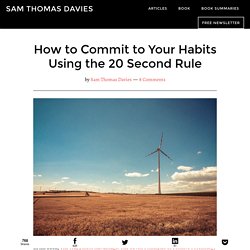
However, he encountered a problem that plagues everyone: He couldn’t motivate himself to do it. No matter how much he tried to motivate himself, his guitar remained in his cupboard. Achor recalls: The guitar was sitting in the closet, a mere 20 seconds away, but I couldn’t make myself take it out and play it. What had gone wrong? The Problem with Willpower Achor’s problem is a common one: If you want to change a habit in the long-term, in the beginning, you have to rely on willpower. In other words, the more decisions you make on a daily basis – the order in which to organise your agenda, what to order for lunch, when to do your groceries and so on – the more likely you are to experience what psychologists call decision fatigue. Willpower: How to Overcome Decision Fatigue and Commit To Your Habits. “If only I had more willpower”.
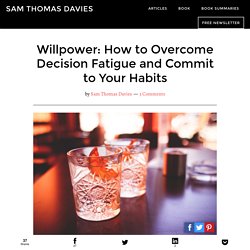
“I can’t will myself to do it”. “My willpower is too low”. There are a lot of excuses people use when asked to provide reasons why they haven’t built (and more importantly) committed to new habits, but none are more common than their blaming of willpower (or a lack thereof). In fact, in one a recent survey (by the American Psychological Association of Annual Stress in America Survey), the number one reason participants provided for not achieving their goals, was a lack of willpower. [1] It’s a given: If you want to build and commit to new habits in the long-term, in the beginning, you have to rely on a willpower to (at least, before it becomes automatised).
However, people become dependent on it and when they do, if, one day, their willpower is low, it become an excuse not to do their habit and all of their hard work can begin to unravel. The Problem with Willpower Your willpower is your ability to say “no” to your impulses. The Radish Experiment 01. 02. 03. Mental Skills. Inflammation.